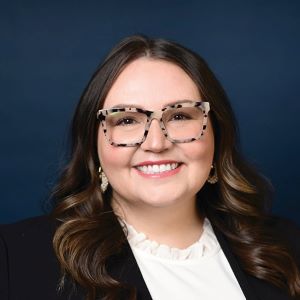
Caroline Moos
cmoos@robinskaplan.com
My favorite fictional lawyer would have to be Ally McBeal. I watched the show growing up and it likely had some early influence on why I wanted to become a lawyer. It is always good to see representation in media, and I think seeing a successful woman lawyer helped me be able to envision myself as one.
Looking back, some aspects of the show may not have aged very gracefully—especially the graphics—but I think there are still some solid takeaways. The situations on the show were definitely not all realistic. And I cringe remembering the depictions of the toxic law firm environment portrayed. That, too, is not super-realistic in my experience. But the lawyers were always working on interesting cases and seemed to be on the “right” side of things. The show portrayed many cases involving harassment and discrimination that could have been lifted from today’s headlines. The clients were usually trying to do the right thing and had compelling stories.
I think I learned some important lessons about client counseling and navigating tough situations from the show. I can even picture many courtroom scenes in which one of the attorneys was giving an opening or closing statement, and I still remember some of their techniques. But the show is undoubtedly a professional responsibility nightmare, as there are many conflicts and inappropriate relationships. Ultimately, I’m not sure it was entirely age-appropriate for me to watch the show when I did, but I’m grateful for what I learned from Ally McBeal—good and bad.
Caroline Moos is an associate at Robins Kaplan. She is a Mitchell Hamline alumna and former judicial clerk. In her practice, she focuses on mass tort and appellate matters.

Adam Spees
adam@cooperlawmn.com
I’ve always loved legal fiction. Whether it was book, a television show, or a movie, I always seemed to be into some new legal fiction story. The first television show I ever really became interested in was the original Law & Order. It was my introduction to legal fiction and I was instantly enthralled. I was just 10 and it aired late in prime time, so I would record the show on an old VCR machine. I had VHS tapes full of hours of episodes that ran back-to-back and I would watch the same episodes over and over. I just couldn’t get enough. The show definitely sparked an interest in the law and lawyering that never left me, but I wanted to be a lawyer even before that time. One of my first memories is when my older sister made a video for a class she was in and I played a high-powered, five-year-old lawyer—suit, briefcase, and all. Wow, did I think I was cool!
Nowadays, my favorite fictional lawyer is Mickey Haller, better known as the Lincoln Lawyer. I first started reading the book series by Michael Connelly and really enjoyed the character. The stories are fun, exciting, and have quite a bit of courtroom drama. As a character, he is smart, smooth, and a bit cocky, but he also seems to really care about his clients and their well-being. And, of course, he always wins in the end. The movie starring Matthew McConaughey was great. The new Netflix series starring Manuel Garcia-Rulfo was also really fun to watch. They each play a unique version of the character and they both play him well.
To be sure, legal fiction has played an important role in my life. It helped foster an interest in the law and the legal profession that began at a very early age and has continued through adulthood.
Adam Spees’s practice is devoted exclusively to Social Security disability law, representing clients from initial application through federal district court. Adam, a graduate of William Mitchell College of Law, lives in Northeast Minneapolis with his cat, Foxy.

Sheena Denny
sheena.denny@mitchellhamline.edu
It’s hard to narrow down my favorite fictional lawyer. I could easily say Matlock, because he was my dad’s favorite, and I grew up watching all the episodes. Atticus Finch is next in mind, because at a time of conspicuous racism, he displayed morality and fought against prejudice.
But if I am being honest, Annalise Keating takes the cake. Putting aside the fact that a handful of her students are murderers, Annalise represents the lot of us. On the surface, she represents Black, queer women in the law. In a profession where Black women make up less than 10 percent of the population, and the LGBTQ population make up less than 3 percent, Annalise represents success. But she is more than that. She shines light on the fact that lawyers are significantly more prone to alcoholism than any other profession. She is not portrayed as a hero. In fact, some consider her an anti-hero. She brings reality to the forefront. An imperfect attorney, like many of us. Complicated, flawed—and wanting to make a difference.
Sheena Denny graduated from Mitchell Hamline in June 2022 and is currently doing an internship with Grant Thornton.

Steve Aggergaard
saggergaard@neuvest.com
The fictional lawyer Atticus Finch is as real as they come for me. Like a lot of kids, I was forced to meet Atticus because the place where he lives, Harper Lee’s novel To Kill a Mockingbird, was assigned reading. I was 14 at the time. Atticus was the first lawyer I recall knowing and Mockingbird the first novel I recall enjoying. I have never seen even a short clip of the movie because I do not want Gregory Peck’s portrayal of Atticus to abrogate my own.
There are three main reasons I was drawn to Atticus and still consider him a role model. First, like a lot of smaller boys, I was bullied a bit and aided by the kids who risked their own reputations by coming to my defense. Atticus did that for his client, Tom Robinson. I liked that, and still do.
Second, less than a year after I read Mockingbird, my mom died. Atticus was a single dad, yet he was able to raise his kids while succeeding in a profession that seemed unattainable for me at the time. Atticus and his kids, Scout and Jem, carried on as a single-parent family. By doing so, they signaled to me that everything would be okay someday, and it was.
Third, once I began my career path as a journalist, then a civil litigator, and now a mixture of both, Atticus provided advice about writing that has proven as valuable as the tip to articulate three main points whenever possible. In the words of Scout, that advice was: “Atticus told me to delete the adjectives and I’d have the facts.”
Steve Aggergaard is a consultant with Twin Cities-based NeuVest, which performs neutral workplace investigations. He has been a civil litigator, higher-education teacher, and newspaper reporter and editor.